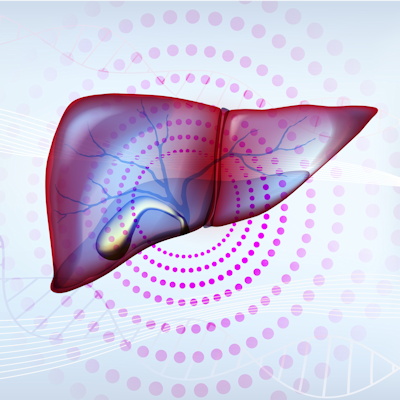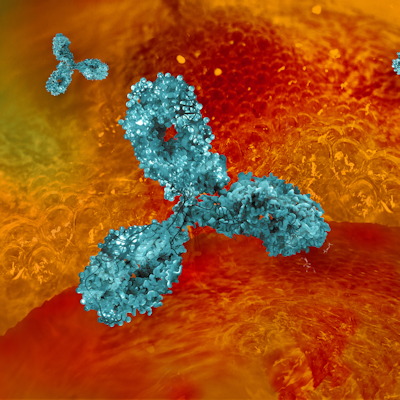June 6, 2023 -- Three clinical trials demonstrated positive results from targeted erdafitinib therapy for patients with multiple tumor types harboring FGFR alterations. The research, funded by pharmaceutical company Janssen Research & Development, was presented at the 2023 American Society of Clinical Oncology's annual meeting, held from June 2 to June 6 in Chicago.
Fibroblast growth factor receptors (FGFRs) play key roles in promoting the proliferation, differentiation, and migration of cancer cells. FGFR genetic alterations can drive the development of many cancer types, including urothelial, bile duct, breast, stomach, liver, and lung cancers. The FGFR inhibitor erdafitinib, an oral medication, was approved in 2019 by the U.S. Food and Drug Administration (FDA) for advanced FGFR-altered urothelial cancer.
The first study, a tumor-agnostic phase II trial called RAGNAR, confirmed the efficacy of erdafitinib in previously treated adult and pediatric patients with advanced FGFR-altered solid tumors. It demonstrated tumor-agnostic benefits, which are based on a cancer's genetic and molecular features, across 16 distinct cancer types.
The ongoing open-label, single-arm trial enrolled 217 patients with cancers including central nervous system tumors, gastrointestinal cancers, gynecologic cancers, and lung cancers, excluding urothelial cancers. Participants ranged in age from 12 to 79, with a median age of 57. All had disease progression after at least one prior systemic therapy and had no alternative treatment options.
The patients' overall response rate was 29.5%, including six complete responses and 58 partial responses. The treatment achieved a disease control rate of 73.7% and a clinical benefit rate of 45.6%, including a response rate of 56% in patients with pancreatic cancer and 52% in cholangiocarcinoma, with 70% experiencing grade 3 or higher adverse side effects.
"This study represents the largest tumor-agnostic trial of a targeted therapy to date, and the results demonstrate that erdafitinib provides meaningful clinical benefit in patients with advanced FGFR-altered solid tumors," first author Dr. Shubham Pant, gastrointestinal medical oncology professor at the University of Texas MD Anderson Cancer Center, said in a statement. "These findings suggest erdafitinib may be an important option, regardless of tumor type, for patients with FGFR alternations who have exhausted other available therapies."
The second study, called NORSE, demonstrated clinically meaningful improvements when adding the immunotherapy cetrelimab to erdafitinib for patients with FGFR-altered metastatic urinary tract cancers. Standard therapy is cisplatin-based chemotherapy, but this regimen has significant side effects and sometimes cannot be tolerated.
The phase II trial randomized 87 patients across the treatment arms. Their median ages were 69 and 72 on the combination and monotherapy arms, respectively. The median follow-up time was 14.2 months.
The combination of erdafitinib with cetrelimab, an anti-PD-1 immune checkpoint inhibitor, achieved an overall response rate of 54.5% across 44 patients, with six complete responses and an overall survival rate of 68% at 12 months. Erdafitinib alone achieved lower rates on all counts. Grade 3 treatment-related adverse side effects occurred in 45.5% of patients receiving the combination treatment and 46.5% of patients receiving erdafitinib alone.
"FGFR-altered tumors typically are immunologically cold and have limited responses to immunotherapy," Dr. Arlene Siefker-Radtke, genitourinary medical oncology professor at the University of Texas MD Anderson Cancer Center, said in a statement. "We are encouraged by the promising responses and median survival results."
Finally, in cohort one of a phase III trial called THOR, erdafitinib significantly improved survival and response outcomes compared to chemotherapy in 266 patients, median age 67, with advanced or metastatic urothelial cancers with FGFR alterations.
The patients' cancers had all progressed after two or fewer prior treatments, including chemotherapy and immunotherapy. The randomized patients received erdafitinib (136) or the investigator's choice of chemotherapy (130); the median overall survival was 12.1 and 7.8 months, respectively. Erdafitinib achieved a median progression-free survival of 5.6 months compared to 2.7 months for chemotherapy. Of the erdafitinib treated patients, 46% had tumors that shrank, compared with 12% on chemotherapy.
"These results demonstrate improved responses and survival outcomes for patients receiving erdafitinib compared to standard-of-care chemotherapy," senior investigator Dr. Arlene Siefker-Radtke said in a statement. "This highlights the significance of a targeted therapy option for patients with FGFR-altered urothelial cancer."
Copyright © 2023 scienceboard.net














